(完整word版)2020年01月浙江高考英语试题WORD版
2020年1月浙江高考英语试题
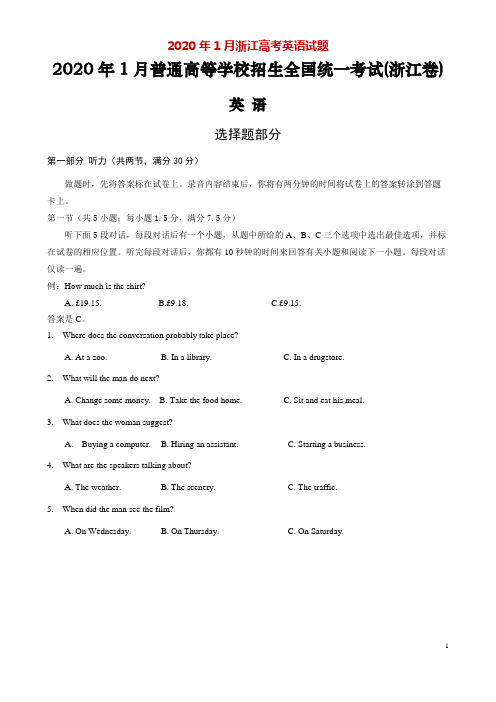
2020年1月浙江高考英语试题2020年1月普通高等学校招生全国统一考试(浙江卷)英语选择题部分第一部分听力(共两节,满分30分)做题时,先将答案标在试卷上。
录音内容结束后,你将有两分钟的时间将试卷上的答案转涂到答题卡上。
第一节(共5小题;每小题1.5分,满分7.5分)听下面5段对话,每段对话后有一个小题,从题中所给的A、B、C三个选项中选出最佳选项,并标在试卷的相应位置。
听完每段对话后,你都有10秒钟的时间来回答有关小题和阅读下一小题。
每段对话仅读一遍。
例:How much is the shirt?A. £19.15.B.£9.18.C.£9.15.答案是C。
1. Where does the conversation probably take place?A. At a zoo.B. In a library.C. In a drugstore.2. What will the man do next?A. Change some money.B. Take the food home.C. Sit and eat his meal.3. What does the woman suggest?A. Buying a computer.B. Hiring an assistant.C. Starting a business.4. What are the speakers talking about?A. The weather.B. The scenery.C. The traffic.5. When did the man see the film?A. On Wednesday.B. On Thursday.C. On Saturday.第二节(共15小题,每小题1.5分,满分22.5分)听下面5段对话,每段对话后有一个小题,从题中所给的A、B、C三个选项中选出最佳选项,并标在试卷的相应位置。
2020年1月浙江英语卷及答案

2020年1月浙江英语卷及答案(总12页)-本页仅作为预览文档封面,使用时请删除本页-2020年1月浙江英语试卷第一部分听力(共两节, 满分30分)做题时,先将答案标在试卷上。
录音内容结束后,你将有两分钟的时间将试卷上的答案转涂到答题纸上。
第一节(共5小题; 每小题分, 满分分)听下面5段对话。
每段对话后有一个小题,从题中所给的A、B、C三个选项中选出最佳选项,并标在试卷的相应位置。
听完每段对话后,你都有10秒钟的时间来回答有关小题和阅读下一小题。
每段对话仅读一遍。
1. Where does the conversation probably take place?A. At a zoo.B. In a library.C. In a drugstore.2. What will the man do nextA. Change some money.B. Take the food home.C. Sit and eat his meal.3. What does the woman suggestA. Buying a computerB. Hiring an assistant.C. Starting a business.4. What are the speakers talking aboutA. The weather.B. The scenery.C. The traffic.5. When did the man see the filmA. On Wednesday.B. On Thursday.C. On Saturday.第二节(共15小题; 每小题分, 满分分)听下面5段对话或独白每段对话或独白后有几个小题,从题中所给的A、B、C三个选项中选出最佳选项,并标在试卷的相应位置。
听每段对话或独白前,你将有时间阅读各个小题, 每小题5秒钟;听完后,各小题将给出5秒钟的作答时间。
2020年浙江省高考英语试卷(1月)(含详细解析)
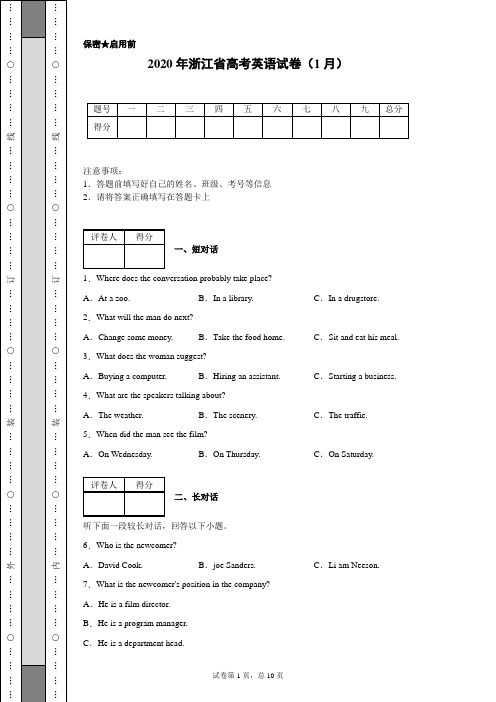
保密★启用前2020年浙江省高考英语试卷(1月)注意事项:1.答题前填写好自己的姓名、班级、考号等信息 2.请将答案正确填写在答题卡上 一、短对话1.Where does the conversation probably take place? A .At a zoo.B .In a library.C .In a drugstore.2.What will the man do next? A .Change some money.B .Take the food home.C .Sit and eat his meal.3.What does the woman suggest? A .Buying a computer.B .Hiring an assistant.C .Starting a business.4.What are the speakers talking about? A .The weather.B .The scenery.C .The traffic.5.When did the man see the film? A .On Wednesday. B .On Thursday. C .On Saturday.二、长对话听下面一段较长对话,回答以下小题。
6.Who is the newcomer? A .David Cook.B .joe Sanders.C .Li am Neeson.7.What is the newcomer's position in the company? A .He is a film director. B .He is a program manager. C .He is a department head.试卷第2页,总10页听下面一段较长对话,回答以下小题。
8.What does the woman do? A .She' a secretary.B .She' a hotel maid.C .She's a salesperson.9.What is the man going to do? A .Change the sheets.B .Have breakfast.C .Meet his friends.10.What does the man ask the woman to do at the end of the conversation? A .Take the plate away. B .Bring some towels.C .Turn on the light.听下面一段较长对话,回答以下小题。
2020年1月浙江省高考英语试卷(2021年整理精品文档)
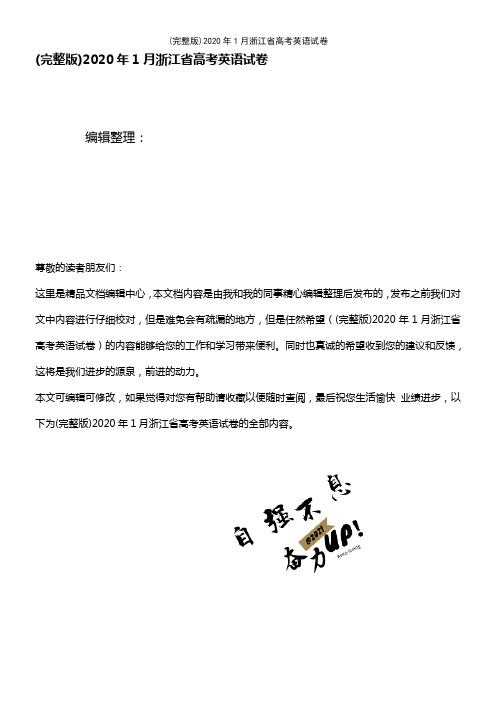
(完整版)2020年1月浙江省高考英语试卷编辑整理:尊敬的读者朋友们:这里是精品文档编辑中心,本文档内容是由我和我的同事精心编辑整理后发布的,发布之前我们对文中内容进行仔细校对,但是难免会有疏漏的地方,但是任然希望((完整版)2020年1月浙江省高考英语试卷)的内容能够给您的工作和学习带来便利。
同时也真诚的希望收到您的建议和反馈,这将是我们进步的源泉,前进的动力。
本文可编辑可修改,如果觉得对您有帮助请收藏以便随时查阅,最后祝您生活愉快业绩进步,以下为(完整版)2020年1月浙江省高考英语试卷的全部内容。
2020年1月浙江省高考英语试卷第一部分听力(共两节, 满分30分)做题时,先将答案标在试卷上。
录音内容结束后,你将有两分钟的时间将试卷上的答案转涂到答题纸上.第一节(共5小题;每小题1.5分,满分7.5分)听下面5段对话。
每段对话后有一个小题,从题中所给的A、B、C三个选项中选出最佳选项,并标在试卷的相应位置.听完每段对话后,你都有10秒钟的时间来回答有关小题和阅读下一小题。
每段对话仅读一遍。
1。
Where does the conversation probably take place?A. At a zoo。
B. In a library。
C. In a drugstore。
2。
What will the man do next?A。
Change some money。
B。
Take the food home. C. Sit and eat his meal。
3。
What does the woman suggest?A。
Buying a computer B. Hiring an assistant. C。
Starting a business。
4。
What are the speakers talking about?A。
The weather. B。
The scenery. C。
2020年1月浙江高考英语试卷答案及解析
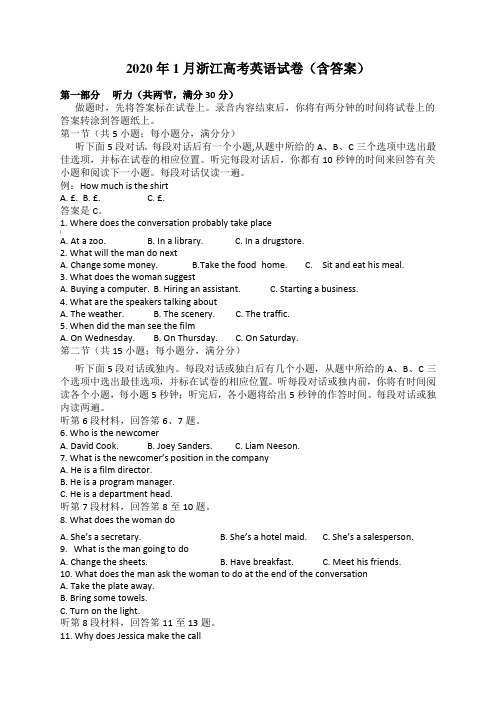
2020年1月浙江高考英语试卷(含答案)第一部分听力(共两节,满分30分)做题时,先将答案标在试卷上。
录音内容结束后,你将有两分钟的时间将试卷上的答案转涂到答题纸上。
第一节(共5小题;每小题分,满分分)听下面5段对话。
每段对话后有一个小题,从题中所给的A、B、C三个选项中选出最佳选项,并标在试卷的相应位置。
听完每段对话后,你都有10秒钟的时间来回答有关小题和阅读下一小题。
每段对话仅读一遍。
例:How much is the shirtA. £.B. £.C. £.答案是C。
1. Where does the conversation probably take place(A. At a zoo.B. In a library.C. In a drugstore.2. What will the man do nextA. Change some money.B.Take the food home.C. Sit and eat his meal.3. What does the woman suggestA. Buying a computer.B. Hiring an assistant.C. Starting a business.4. What are the speakers talking aboutA. The weather.B. The scenery.C. The traffic.5. When did the man see the filmA. On Wednesday.B. On Thursday.C. On Saturday.笫二节(共15小题;每小题分,满分分)-听下面5段对话或独内。
每段对话或独白后有几个小题,从题中所给的A、B、C三个选项中选出最佳选项,并标在试卷的相应位置。
听每段对话或独内前,你将有时间阅读各个小题,每小题5秒钟;听完后,各小题将给出5秒钟的作答时间。
2020年1月浙江省普通高校招生选考科目考试英语试卷(含答案)
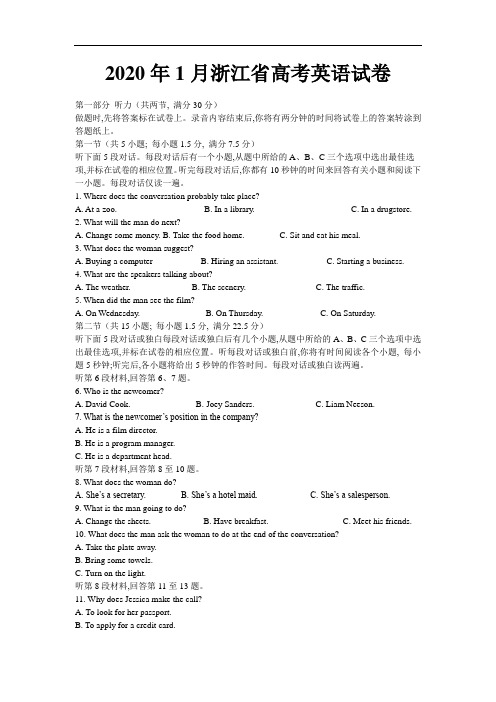
2020年1月浙江省高考英语试卷第一部分听力(共两节, 满分30分)做题时,先将答案标在试卷上。
录音内容结束后,你将有两分钟的时间将试卷上的答案转涂到答题纸上。
第一节(共5小题; 每小题1.5分, 满分7.5分)听下面5段对话。
每段对话后有一个小题,从题中所给的A、B、C三个选项中选出最佳选项,并标在试卷的相应位置。
听完每段对话后,你都有10秒钟的时间来回答有关小题和阅读下一小题。
每段对话仅读一遍。
1. Where does the conversation probably take place?A. At a zoo.B. In a library.C. In a drugstore.2. What will the man do next?A. Change some money.B. Take the food home.C. Sit and eat his meal.3. What does the woman suggest?A. Buying a computerB. Hiring an assistant.C. Starting a business.4. What are the speakers talking about?A. The weather.B. The scenery.C. The traffic.5. When did the man see the film?A. On Wednesday.B. On Thursday.C. On Saturday.第二节(共15小题; 每小题1.5分, 满分22.5分)听下面5段对话或独白每段对话或独白后有几个小题,从题中所给的A、B、C三个选项中选出最佳选项,并标在试卷的相应位置。
听每段对话或独白前,你将有时间阅读各个小题, 每小题5秒钟;听完后,各小题将给出5秒钟的作答时间。
每段对话或独白读两遍。
听第6段材料,回答第6、7题。
2020年1月浙江英语卷及答案

2020年1月浙江英语试卷第一部分听力(共两节,满分30分)做题时,先将答案标在试卷上。
录音内容结束后,你将有两分钟的时间将试卷上的答案转涂到答题纸上。
第一节(共5小题;每小题1。
5分, 满分7。
5分)听下面5段对话。
每段对话后有一个小题,从题中所给的A、B、C三个选项中选出最佳选项,并标在试卷的相应位置。
听完每段对话后,你都有10秒钟的时间来回答有关小题和阅读下一小题。
每段对话仅读一遍.1。
Where does the conversation probably take place?A. At a zoo. B。
In a library. C。
In a drugstore.2. What will the man do next?A。
Change some money. B。
Take the food home。
C。
Sit and eat his meal.3. What does the woman suggest?A。
Buying a computer B. Hiring an assistant。
C. Starting a business.4. What are the speakers talking about?A。
The weather。
B。
The scenery。
C。
The traffic。
5。
When did the man see the film?A。
On Wednesday. B。
On Thursday。
C。
On Saturday。
第二节(共15小题;每小题1。
5分, 满分22。
5分)听下面5段对话或独白每段对话或独白后有几个小题,从题中所给的A、B、C三个选项中选出最佳选项,并标在试卷的相应位置。
听每段对话或独白前,你将有时间阅读各个小题,每小题5秒钟;听完后,各小题将给出5秒钟的作答时间。
每段对话或独白读两遍。
听第6段材料,回答第6、7题。
2020年浙江省1月高考英语试卷word版

2020年1月浙江省高考英语试卷选择题部分第一部分听力(共两节,满分30分)第一节(共5小题;每小题分,满分分)听下面5段对话。
每段对话后有一个小题,从题中所给的A、B、C三个选项中选出最佳选项,并标在试卷的相应位置。
听完每段对话后,你都有10秒钟的时间来回答有关小题和阅读下一小题。
每段对话仅读一遍。
1. Where does the conversation probably take placeA. At a zoo.B. In a library.C. In a drugstore.2. What will the man do nextA. Change some money.B. Take the food home.C. Sit and eat his meal.3. What does the woman suggestA. Buying a computer.B. Hiring an assistant.C. Starting a business.4. What are the speakers talking aboutA. The weather.B. The scenery.C. The traffic.5. When did the man see the filmA. On Wednesday.B. On Thursday.C. On Saturday.第二节(共15小题;每小题分,满分分)听下面5段对话或独白。
每段对话或独白后有几个小题,从题中所给的A、B、C三个选项中选出最佳选项,并标在试卷的相应位置。
听每段对话或独白前,你将有时间阅读各个小题,每小题5秒钟;听完后,各小题给出5秒钟的作答时间。
每段对话或独自读两遍。
听第6段材料,回答第6、7题。
6. Who is the newcomerA. David Cook.B. Joey Sanders.C. Liam Neeson.7. What is the newcomer’s position in the companyA. He is a film director. BV. He is a program manager. C. He is a department head.听第7段材料,回答第8至10题。
2020年浙江省高考英语试卷【word版本;可编辑;含答案】
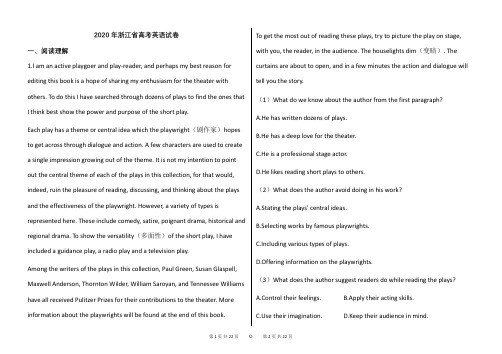
2020年浙江省高考英语试卷一、阅读理解1.I am an active playgoer and play-reader, and perhaps my best reason for editing this book is a hope of sharing my enthusiasm for the theater with others. To do this I have searched through dozens of plays to find the ones that I think best show the power and purpose of the short play.Each play has a theme or central idea which the playwright(剧作家)hopes to get across through dialogue and action. A few characters are used to create a single impression growing out of the theme. It is not my intention to point out the central theme of each of the plays in this collection, for that would, indeed, ruin the pleasure of reading, discussing, and thinking about the plays and the effectiveness of the playwright. However, a variety of types is represented here. These include comedy, satire, poignant drama, historical and regional drama. To show the versatility(多面性)of the short play, I have included a guidance play, a radio play and a television play.Among the writers of the plays in this collection, Paul Green, Susan Glaspell, Maxwell Anderson, Thornton Wilder, William Saroyan, and Tennessee Williams have all received Pulitzer Prizes for their contributions to the theater. More information about the playwrights will be found at the end of this book. To get the most out of reading these plays, try to picture the play on stage, with you, the reader, in the audience. The houselights dim(变暗). The curtains are about to open, and in a few minutes the action and dialogue will tell you the story.(1)What do we know about the author from the first paragraph?A.He has written dozens of plays.B.He has a deep love for the theater.C.He is a professional stage actor.D.He likes reading short plays to others.(2)What does the author avoid doing in his work?A.Stating the plays' central ideas.B.Selecting works by famous playwrights.C.Including various types of plays.D.Offering information on the playwrights.(3)What does the author suggest readers do while reading the plays? A.Control their feelings. B.Apply their acting skills.e their imagination.D.Keep their audience in mind.(4)What is this text?A.A short story.B.An introduction to a book.C.A play review.D.An advertisement for a theater.2.The traffic signals along Factoria Boulevard in Bellevue, Washington, generally don't flash the same length of green twice in a row, especially at rush hour. At 9:30 am, the full red/yellow/green signal cycle might be 140 seconds. By 9:33 am, a burst of additional traffic might push it to 145 seconds. Less traffic at 9:37am could push it down to 135. Just like the traffic itself, the timing of the signals changes.That is by design. Bellevue, a fast-growing city, just east of Seattle, uses a system that is gaining popularity around the US: intersection(十字路口)signals that can adjust in real time to traffic conditions. These lights, known as adaptive signals, have led to significant declines in both the trouble and cost of travels between work and home."Adaptive signals can make sure that the traffic demand that is there is being addressed," says Alex Stevanovic, a researcher at Florida Atlantic University. For all of Bellevue's success, adaptive signals are not a cure-all for jammed roadways. Kevin Balke, a research engineer at the Texas A&M University Transportation Institute, says that while smart lights can be particularly beneficial for some cities, others are so jammed that only a sharp reduction in the number of cars on the road will make a meaningful difference. "It's not going to fix everything, but adaptive signals have some benefits for smaller cities," he says.In Bellevue, the switch to adaptive signals has been a lesson in the value of welcoming new approaches. In the past, there was often an automatic reaction to increased traffic: just widen the roads, says Mark Poch, the Bellevue Transportation Department's traffic engineering manager. Now he hopes that other cities will consider making their streets run smarter instead of just making them bigger.(1)What does the underlined word "that" in paragraph 2 refer to?A.Increased length of green lights.B.Shortened traffic signal cycle.C.Flexible timing of traffic signals.D.Smooth traffic flow on the road.(2)What does Kevin Balke say about adaptive signals?A.They work better on broad roads.B.They should be used in other cities.C.They have greatly reduced traffic on the road.D.They are less helpful in cities seriously jammed.(3)What can we learn from Bellevue's success?A.It is rewarding to try new things.B.The old methods still work today.C.I pays to put theory into practice.D.The simplest way is the best way.3.Challenging work that requires lots of analytical thinking, planning and other managerial skills might help your brain stay sharp as you age, a study published Wednesday in the journal Neurology suggests.Researchers from the University of Leipzig in Germany gathered more than 1,000 retired workers who were over age 75 and assessed the volunteers' memory and thinking skills through a battery of tests. Then, for eight years, the scientists asked the same group to come back to the lab every 18 months to take the same sorts of tests.Those who had held mentally stimulating(刺激), demanding jobs before retirement tended to do the best on the tests. And they tended to lose cognitive(认知)function at a much slower rate than those with the least mentally challenging jobs. The results held true even after the scientists accounted for the participants' overall health status."This works just like physical exercise," says Francisca Then, who led the study. "After a long run, you may feel like you're in pain, you may feel tired. But it makes you fit. After a long day at work-sure, you will feel tired, but it can help your brain stay healthy."It's not just corporate jobs, or even paid work that can help keep your brain fit, Then points out. A waiter's job, for example, that requires multitasking, teamwork and decision-making could be just as stimulating as any high-level office work. And "running a family household requires high-level planning and coordinating(协调)," she says. "You have to organize the activities of the children and take care of the bills and groceries."Of course, our brains can decline as we grow older for lots of reasons-including other environmental influences or genetic factors. Still, continuing to challenge yourself mentally and keeping your mind busy can only help.。
最新2020年浙江省1月高考英语试卷word版

2020年1月浙江省高考英语试卷选择题部分第一部分听力(共两节,满分30分)第一节(共5小题;每小题1.5分,满分7.5分)听下面5段对话。
每段对话后有一个小题,从题中所给的A、B、C三个选项中选出最佳选项,并标在试卷的相应位置。
听完每段对话后,你都有10秒钟的时间来回答有关小题和阅读下一小题。
每段对话仅读一遍。
1. Where does the conversation probably take place?A. At a zoo.B. In a library.C. In a drugstore.2. What will the man do next?A. Change some money.B. Take the food home.C. Sit and eat his meal.3. What does the woman suggest?A. Buying a computer.B. Hiring an assistant.C. Starting a business.4. What are the speakers talking about?A. The weather.B. The scenery.C. The traffic.5. When did the man see the film?A. On Wednesday.B. On Thursday.C. On Saturday.第二节(共15小题;每小题1.5分,满分22.5分)听下面5段对话或独白。
每段对话或独白后有几个小题,从题中所给的A、B、C三个选项中选出最佳选项,并标在试卷的相应位置。
听每段对话或独白前,你将有时间阅读各个小题,每小题5秒钟;听完后,各小题给出5秒钟的作答时间。
每段对话或独自读两遍。
听第6段材料,回答第6、7题。
6. Who is the newcomer?A. David Cook.B. Joey Sanders.C. Liam Neeson.7. What is the newcomer’s position in the company?A. He is a film director. BV. He is a program manager. C. He is a department head.听第7段材料,回答第8至10题。
2020年1月浙江高考英语试题
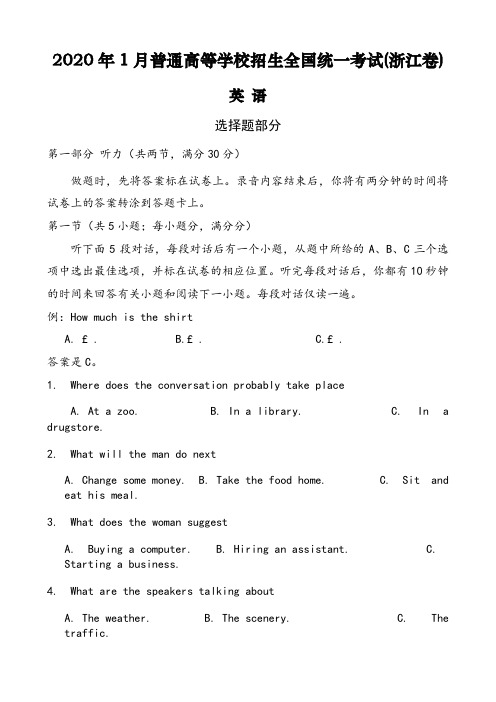
2020年1月普通高等学校招生全国统一考试(浙江卷)英语选择题部分第一部分听力(共两节,满分30分)做题时,先将答案标在试卷上。
录音内容结束后,你将有两分钟的时间将试卷上的答案转涂到答题卡上。
第一节(共5小题;每小题分,满分分)听下面5段对话,每段对话后有一个小题,从题中所给的A、B、C三个选项中选出最佳选项,并标在试卷的相应位置。
听完每段对话后,你都有10秒钟的时间来回答有关小题和阅读下一小题。
每段对话仅读一遍。
例:How much is the shirtA. £.B.£.C.£.答案是C。
1. Where does the conversation probably take placeA. At a zoo.B. In a library.C. In a drugstore.2. What will the man do nextA. Change some money.B. Take the food home.C. Sit andeat his meal.3. What does the woman suggestA. Buying a computer.B. Hiring an assistant.C.Starting a business.4. What are the speakers talking aboutA. The weather.B. The scenery.C. Thetraffic.5. When did the man see the filmA. On Wednesday.B. On Thursday.C. OnSaturday.第二节(共15小题,每小题分,满分分)听下面5段对话,每段对话后有一个小题,从题中所给的A、B、C三个选项中选出最佳选项,并标在试卷的相应位置。
听完每段对话后,你将有时间阅读各个小题,每小题5秒钟;听完后,各小题将给出5秒钟的作答时间。
2020年1月浙江高考英语试卷
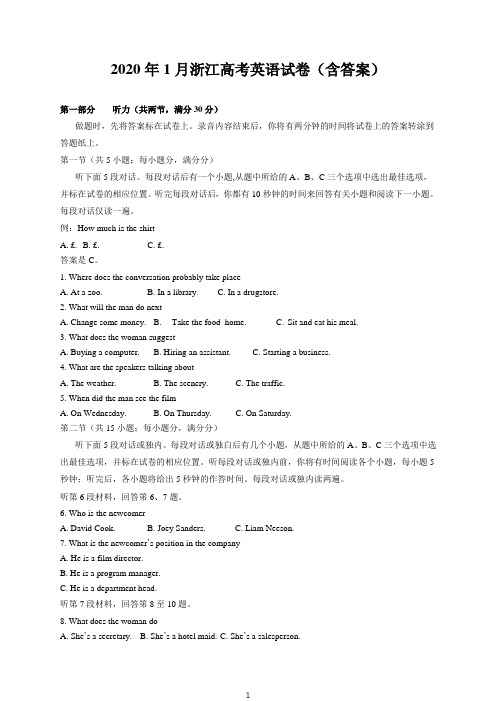
2020年1月浙江高考英语试卷(含答案)第一部分听力(共两节,满分30分)做题时,先将答案标在试卷上。
录音内容结束后,你将有两分钟的时间将试卷上的答案转涂到答题纸上。
第一节(共5小题;每小题分,满分分)听下面5段对话。
每段对话后有一个小题,从题中所给的A、B、C三个选项中选出最佳选项,并标在试卷的相应位置。
听完每段对话后,你都有10秒钟的时间来回答有关小题和阅读下一小题。
每段对话仅读一遍。
例:How much is the shirtA. £.B. £.C. £.答案是C。
1. Where does the conversation probably take placeA. At a zoo.B. In a library.C. In a drugstore.2. What will the man do nextA. Change some money.B. Take the food home.C. Sit and eat his meal.3. What does the woman suggestA. Buying a computer.B. Hiring an assistant.C. Starting a business.4. What are the speakers talking aboutA. The weather.B. The scenery.C. The traffic.5. When did the man see the filmA. On Wednesday.B. On Thursday.C. On Saturday.笫二节(共15小题;每小题分,满分分)听下面5段对话或独内。
每段对话或独白后有几个小题,从题中所给的A、B、C三个选项中选出最佳选项,并标在试卷的相应位置。
听每段对话或独内前,你将有时间阅读各个小题,每小题5秒钟;听完后,各小题将给出5秒钟的作答时间。
2020年全国统一高考英语试题(浙江卷)真题(Word版+答案+解析)

21.What do we know about the author from the first paragraph?
A.He has written dozens of plays.B.He has a deep love for the theater.
C.He is a professional stage actor.D.He likes reading short plays to others.
2020年全国统一高考英语试题(浙江卷)
选择题部分
第一部分听力(共两节,满分30分)
做题时,先将答案标在试卷上。录音内容结束后,你将有两分钟的时间将试卷上的答案转涂到答题纸上。
第一节(共5小题:每小题1.5分,满分7.5分)
听下面5段对话。每段对话后有一个小题,从题中所给的A、B、C三个选项中选出最佳选项,并标在试卷的相应位置。听完每段对话后,你都有10秒钟的时间来回答有关小题和阅读下一小题。每段对话仅读一遍。
第一节(共10小题:每小题2.5分,满分25分)
阅读下列短文,从每题所给的A、B、C和D四个选项中,选出最佳选项,并在答题纸上将该项涂黑。
A
I am an active playgoer and play-reader, and perhaps my best reason for editing this book is a hope of sharing my enthusiasm for the theater with others. To do this I have searched through dozens of plays to find the ones that I think best show the power and purpose of the short play.
浙江省高考英语试卷word版.pdf
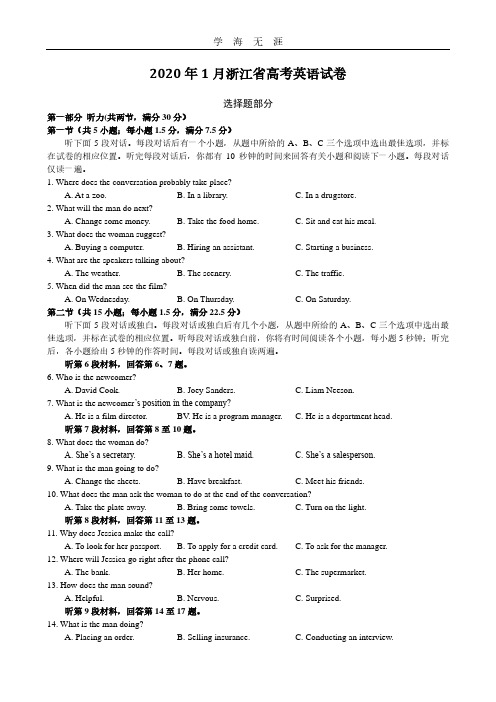
2020年1月浙江省高考英语试卷选择题部分第一部分听力(共两节,满分30分)第一节(共5小题;每小题1.5分,满分7.5分)听下面5段对话。
每段对话后有一个小题,从题中所给的A、B、C三个选项中选出最佳选项,并标在试卷的相应位置。
听完每段对话后,你都有10秒钟的时间来回答有关小题和阅读下一小题。
每段对话仅读一遍。
1. Where does the conversation probably take place?A. At a zoo.B. In a library.C. In a drugstore.2. What will the man do next?A. Change some money.B. Take the food home.C. Sit and eat his meal.3. What does the woman suggest?A. Buying a computer.B. Hiring an assistant.C. Starting a business.4. What are the speakers talking about?A. The weather.B. The scenery.C. The traffic.5. When did the man see the film?A. On Wednesday.B. On Thursday.C. On Saturday.第二节(共15小题;每小题1.5分,满分22.5分)听下面5段对话或独白。
每段对话或独白后有几个小题,从题中所给的A、B、C三个选项中选出最佳选项,并标在试卷的相应位置。
听每段对话或独白前,你将有时间阅读各个小题,每小题5秒钟;听完后,各小题给出5秒钟的作答时间。
每段对话或独自读两遍。
听第6段材料,回答第6、7题。
6. Who is the newcomer?A. David Cook.B. Joey Sanders.C. Liam Neeson.7. What is the newcomer’s position in the company?A. He is a film director. BV. He is a program manager. C. He is a department head.听第7段材料,回答第8至10题。
2020年浙江省高考英语试卷(1月)

2020年浙江省高考英语试卷(1月)学校:___________姓名:___________班级:___________考号:___________一、短对话1.Where does the conversation probably take place?A.At a zoo.B.In a library.C.In a drugstore. 2.What will the man do next?A.Change some money.B.Take the food home.C.Sit and eat his meal. 3.What does the woman suggest?A.Buying a computer.B.Hiring an assistant.C.Starting a business. 4.What are the speakers talking about?A.The weather.B.The scenery.C.The traffic. 5.When did the man see the film?A.On Wednesday.B.On Thursday.C.On Saturday.二、长对话听下面一段较长对话,回答以下小题。
6.Who is the newcomer?A.David Cook.B.joe Sanders.C.Li am Neeson. 7.What is the newcomer's position in the company?A.He is a film director.B.He is a program manager.C.He is a department head.听下面一段较长对话,回答以下小题。
8.What does the woman do?A.She' a secretary.B.She' a hotel maid.C.She's a salesperson. 9.What is the man going to do?A.Change the sheets.B.Have breakfast.C.Meet his friends. 10.What does the man ask the woman to do at the end of the conversation?A.Take the plate away.B.Bring some towels.C.Turn on the light.听下面一段较长对话,回答以下小题。
2020年1月浙江高考英语试题

2020年1月普通高等学校招生全国统一考试(浙江卷)英语选择题部分第一部分听力(共两节,满分30分)做题时,先将答案标在试卷上。
录音内容结束后,你将有两分钟的时间将试卷上的答案转涂到答题卡上。
第一节(共5小题;每小题1.5分,满分7.5分)听下面5段对话,每段对话后有一个小题,从题中所给的A、B、C三个选项中选出最佳选项,并标在试卷的相应位置。
听完每段对话后,你都有10秒钟的时间来回答有关小题和阅读下一小题。
每段对话仅读一遍。
例:How much is the shirt?A. £19.15.B.£9.18.C.£9.15.答案是C。
1. Where does the conversation probably take place?A. At a zoo.B. In a library.C. In a drugstore.2. What will the man do next?A. Change some money.B. Take the food home.C. Sit and eat his meal.3. What does the woman suggest?A. Buying a computer.B. Hiring an assistant.C. Starting a business.4. What are the speakers talking about?A. The weather.B. The scenery.C. The traffic.5. When did the man see the film?A. On Wednesday.B. On Thursday.C. On Saturday.第二节(共15小题,每小题1.5分,满分22.5分)听下面5段对话,每段对话后有一个小题,从题中所给的A、B、C三个选项中选出最佳选项,并标在试卷的相应位置。
【高考试卷】2020年1月浙江英语卷及答案
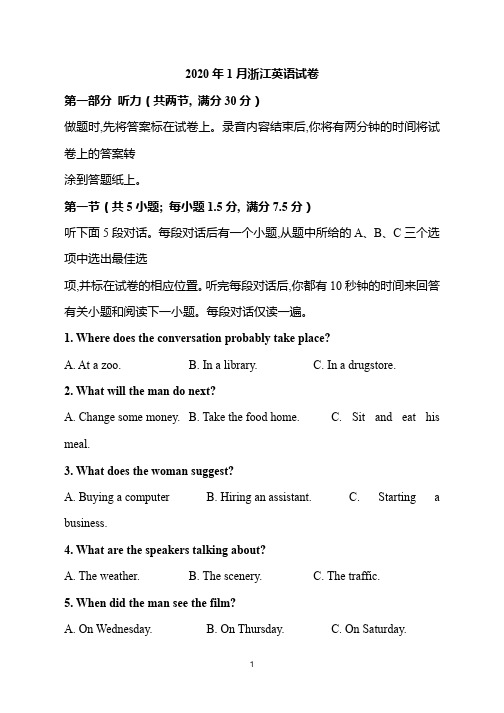
2020年1月浙江英语试卷第一部分听力(共两节, 满分30分)做题时,先将答案标在试卷上。
录音内容结束后,你将有两分钟的时间将试卷上的答案转涂到答题纸上。
第一节(共5小题; 每小题1.5分, 满分7.5分)听下面5段对话。
每段对话后有一个小题,从题中所给的A、B、C三个选项中选出最佳选项,并标在试卷的相应位置。
听完每段对话后,你都有10秒钟的时间来回答有关小题和阅读下一小题。
每段对话仅读一遍。
1. Where does the conversation probably take place?A. At a zoo.B. In a library.C. In a drugstore.2. What will the man do next?A. Change some money.B. Take the food home.C. Sit and eat his meal.3. What does the woman suggest?A. Buying a computerB. Hiring an assistant.C. Starting a business.4. What are the speakers talking about?A. The weather.B. The scenery.C. The traffic.5. When did the man see the film?A. On Wednesday.B. On Thursday.C. On Saturday.第二节(共15小题; 每小题1.5分, 满分22.5分)听下面5段对话或独白每段对话或独白后有几个小题,从题中所给的A、B、C三个选项中选出最佳选项,并标在试卷的相应位置。
听每段对话或独白前,你将有时间阅读各个小题, 每小题5秒钟;听完后,各小题将给出5秒钟的作答时间。
每段对话或独白读两遍。
听第6段材料,回答第6、7题。
- 1、下载文档前请自行甄别文档内容的完整性,平台不提供额外的编辑、内容补充、找答案等附加服务。
- 2、"仅部分预览"的文档,不可在线预览部分如存在完整性等问题,可反馈申请退款(可完整预览的文档不适用该条件!)。
- 3、如文档侵犯您的权益,请联系客服反馈,我们会尽快为您处理(人工客服工作时间:9:00-18:30)。
2020年01月浙江高考英语试题第一部分:听力(共两节,满分30分)做题时先将答案标在试卷上,录音内容结束后,你将有两分钟的时间将试卷上的答案转涂到答题纸上。
第一节(共5小题,每小题1.5分,满分7.5分。
)听下面5段对话,每段对话后有一个小题,从题中所给的A、B、C三个选项中选出最佳答案,并标在试卷的相应位置。
听完每段对话后,你都有10秒钟的时间来回答有关小题和阅读下一小题,每段对话仅读一遍。
例:How much is the shirt?A.£19.15B. £9.18C. £9.15答案:C1.Where does the conversation probably take place?A.At a zooB.In a libraryC.In a drugstore.2.What will the man do next?A.Change some money.B.Take the food home.C.Sit and eat his meal.3.What does the woman suggest?A.Buying a computer.B.Hiring an assistant.C.Starting a business.4.What are the speakers talking about?A.The weatherB.The sceneryC.The traffic.5.When did the man see the film?A.On WednesdayB.On Thursday.C.On Saturday.第二节(共15小题,每小题1.5分,满分22.5分)听下面5段对话,每段对话后有几个小题,从题中所给的A、B、C三个选项中选出最佳选项,并标在试卷的相应位置。
听每段对话前,你将有时间阅读各个小题,每小题5秒钟;听完后,各小题将给出5秒钟的作答时间。
每段对话或独白读两遍。
听第6段材料,回答第6、7题。
6.Who is the newcomer?A.David CookB.Joey SandersC.Liam Neeson7.What is the newcomer’s position in the company?A.He is a film diractor.B.He is a programme manager.C.He is a department head.听第7段材料,回答第8-10题。
8.What does the woman do?A.She’s a secretary.B.She’s a hotel maid.C.She’s a salesperson.9.What is the man going to do?A.Change the sheets.B.Have breakfast.C.Meet his friends.10.What does the man ask the woman to do at the end of the conversation?A.Take the plate away.B.Bring some towels.C.Turn on the light.听第8段材料,回答第11~13题。
11.Why does Jessica make the call?A.To look for her passport.B.To apply for a credit card.C.To ask for the manager.12.Where will Jessica go right after the phone call?A.The bank.B.Her home.C.The supermarket.13.How does the man sound?A.Helpful.B.Nervous.C.Surprised.听第9段材料,回答第14~17题。
14.What is the man doing?A.Placing an order.B.Selling insurance.C.Conducting an interview.15.What did Leaney study for a degree?A.Finance.cation.C.Public Relations.16.What is an advantage of a smaller business according to Leaney?A.Greater contributions to the neighborhood.B.Closer employer-employee relationship.C.More flexibility in providing services.17.What is Leaney’s plan for the next two weeks?A.To visit her parents.B.To call her relatives.C.To finish her work.听第10段材料,回答第18~20题。
18.What is the purpose of the talk?A.To present a prize.B.To introduce a lecturer.C.To recommend a book.19.Where is Russel working now?A.In Oxford.B.In Chicago.C.In Virginia.20.What does Russel think of sleep?A.It’s seldom studied.B.It’s just a waste of time.C.It’s of great importance.第二部分阅读理解(共两节,满分40分)第一节(共15小题,每小题2分,满分30分)阅读下列短文,从每题所给的4个选项(A,B,C和D)中选出最佳选项,并在答题卡上将该项涂黑。
AI never knew anyone who'd grown up in Jackson without being afraid of Mrs.Calloway, our librarian. She ran Jackson's Carnegie Library absolutely by herself. SILENCE in big black letters was on signs hung everywhere. If she thought you were dressed inproperty, she sent you straight back home to change your clothes.I was willing;I would do anything to read。
My mother was not afraid of Mrs. Calloway. She wished me to have my own library card to check out the books for myself. She took me in to introduce me."Eudora is nine years old and has my permission to read any book she wants from the shelves,children or adults,"Mother said。
Mrs.Calloway made her own rules about books.You could not take back a book to the library on the same day you'd taken it out;it made no difference to her that you'd read every word in it and needed another to start.You could take out two books at a time and two only.So two by two, I read the library books as fast as I could go, rushing them home in the basket of my bicycle. From the minute I reached our house,I started to read,I knew this was extreme happiness,knew it at the time。
My mother shared this feeling of mine.Now, I think of her as reading so much of the time while doing something else.I remember her reading a magazine while taking the part of the Wolf in a game of “Little Red Riding Hood”with my brother's two daughters.She’d just look up at the right time, long enough to answer-in character- “The better to eat you with, my dear,” and go back to her place in the magazine article。
21.Which of the following best describes Mrs.Calloway?A.QuietB.StrictC.HumorousD.Considerate.22.What do the underlined words “this feeling” refer refer to in the last paragraph?A.Desire to read.B.Love for Mrs.CallowayC.Interest in gamesD.Fear of the library rules.23.Where is the text probably from?A.a guide bookB.an autobiographyC.a new reportD.a book review。
